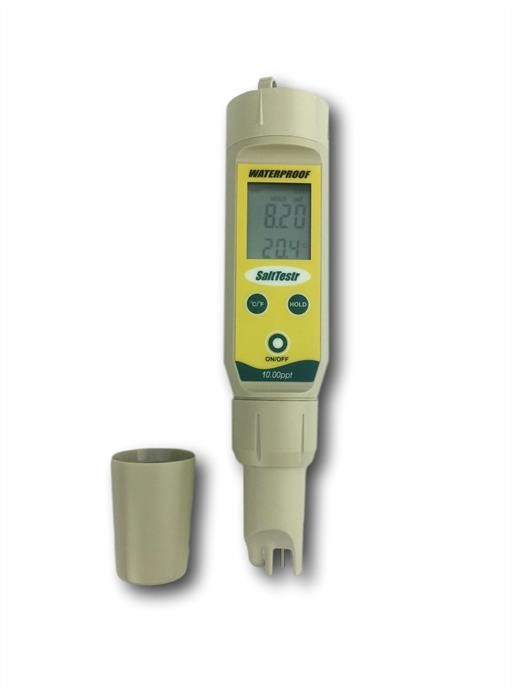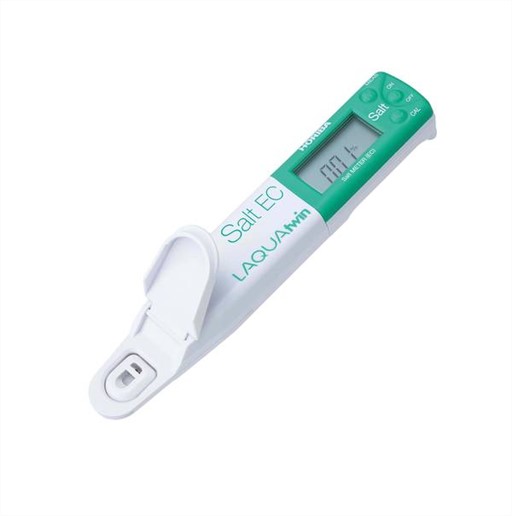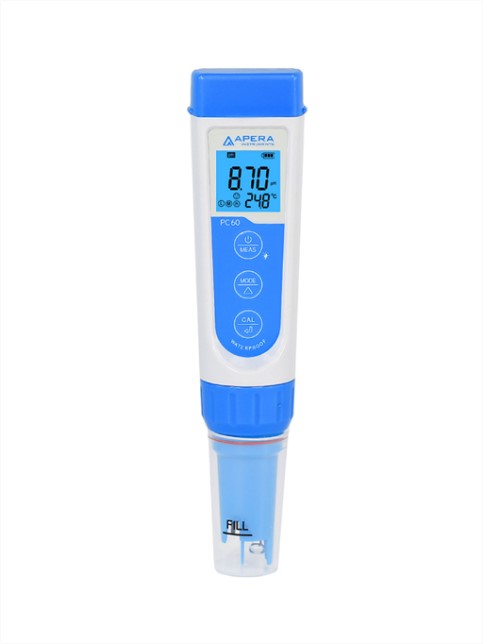5 of the best Salinity Meters for the home pool

Let’s be frank; no one likes pool maintenance. If you have a saltwater pool or a spa, there’s a device that can help take the guesswork out of maintenance and ensure you get the use of your pool this summer.
What’s the device? A salinity meter!
Instrument Choice Scientists have put together a review of the five best salinity meters for home pool use.
About Salinity Meters
A salinity meter is a small handheld device used to measure the salt levels within water quickly and easily. Using one of these can have the accurate salinity level of your pool displayed on an LCD screen within seconds.
When used in the home saltwater pool, it takes the guesswork out of pool maintenance by providing you accurate results so that you can take any corrective actions right away.
|
Instrument Choice Scientist Tip: Salinity levels will display as parts per million (ppm), parts per thousand (ppt), grams per litre (g/l), or milligrams per litre (mg/L), depending on the device you are using. Always check the displayed level units to avoid confusion! |
It’s common knowledge that saltwater pools require much less maintenance than chlorinated pools. Having a salinity meter makes the small amount of maintenance associated with saltwater pools even easier by removing the guesswork of adding, diluting, or maintaining salt levels.
Four common questions about salinity meters for home pools are:
1. Why use a salinity meter for the home pool?
Regularly checking your pool salt levels can avoid issues associated with salt levels being out of range. Examples of issues arising from out of range levels include;
- Higher than ideal salt levels could damage the chlorinator cell or damage equipment in your pool.
- Lower than ideal salt levels will cause the pool to become unsanitary and unsuitable for use.
Check your saltwater chlorination pump for manufacturer specifics on ideal salinity levels.
2. When installing the pool, I added salt to the required levels, why do I need a salinity meter?
The salinity of a saltwater pool can change over time, and salt top-ups will be required. Somewhere around 20-30% will be lost every year due to overflow, splashing, and backwashing. Therefore salt top-ups and regular salinity checks are recommended to keep your pool clean and usable.
3. How often should I be checking the salinity of my pool?
Instrument Choice scientists recommend you perform a pool salinity test weekly.
4. My chlorinator salt cell has a display with the salt level on it, why do I need a salinity meter?
Most salt chlorinators will display the salt level of your pool. It is best practice to have a salinity meter as a secondary tester of salt levels to mitigate any inconsistencies the pump reader may have. A secondary benefit of this practice is that it will highlight whether your chlorinator needs recalibration.
The 5 Best Salinity Meters for Home Pools
To help you get the pool ready for summer, The Instrument Choice Scientists have put together the five best salinity meters to measure the salt concentration of your home pool.
1. EC-SaltTestr11 - Waterproof Salt Tester
The EC-SaltTestr20 is the most popular home pool salinity meters available from Instrument Choice. Obtain salinity results on the crisp LCD screen at the touch of a button. The device also displays water temperature when taking a measurement, saving you the extra cost of buying a separate thermometer.
The device is waterproof and as a bonus floats on water. So, there’s no need to stress about having to retrieve the EC-SaltTestr11 from the bottom of the pool on a chilly afternoon.
Quick Specs
Salinity Range: 0 to 10.00 ppt
Resolution: 0.10 ppt
Accuracy:± 1% of Full Scale
Calibration Points:1 point
IP Rating: IP67
ATC: Yes
2. LAQUAtwin Compact Salt Meter - Salt-11
This salinity meter is slightly different from the others listed. It is a compact meter that measures specific sodium ions to calculate the NaCI based salt concentration. (The other devices measure conductivity and convert measurements into salinity readings). You can read more about conductivity converted meters here.
This meter has a unique flat sensor design. Rather than dipping the meter into a pool or container of water, you check your water sample by simply dropping the sample onto the sensor via a pipette (included), close the lid and wait for a reading.
Quick Specs
Salinity Range: 0.0 to 100.0 g/L
Resolution: 0.01g/L
Accuracy: ±2% full scale (0.0 to 9.9 g/L), ±4% full scale (10.0 to 100.0 g/L)
Calibration Points: 1-2 points
IP Rating: IP67
ATC: Yes
3. StarterPen Salinity meter - IC-ST20S.jpg?Action=thumbnail&algorithm=fill_proportional&width=228)
ATC: Yes
4. Ultrapen Pt1 Conductivity, Salinity, and Tds Meter.jpg?Action=thumbnail&algorithm=fill_proportional&width=276)
Want the accuracy of benchtop lab equipment within an affordable, portable, compact pen?
The IC-ML-PT1 is a multiparameter meter able to measure salinity, conductivity, TDS, and temperature. For fast, accurate results, all you need to do is dip the pen in water and press a button – it’s that easy!
The device is waterproof, and inside of its rugged aluminium body contains shock resistant, fully encapsulated electronics.
Quick Specs
Salinity Range: 0.0010 - 9.999 ppt salinity
Resolution: 0.0001 for 0.0010 - 0.0999 ppt/0.001 for 0.100 - 9.999 ppt
Accuracy: ±1% of reading
Calibration Points: 1 point
IP Rating: IP67
ATC: Yes
5. PC60 Premium Multiparameter Pocket Tester Kit
The PC60 not only measures the salinity of your pool but can also measure pH, electrical conductivity, TDS, and temperature, eliminating the need for multiple instruments.
The IC-PC60 comes in a complete kit complete with everything you need to get started. The package includes calibration solutions, calibration bottles, storage solutions, AAA batteries, a lanyard, and a portable carrying case.
Quick Specs
Salinity Range: 0 to 10ppt
Resolution: 0.01ppt
Accuracy:± 1% of Full Scale
Calibration Points: 1-3 points
IP Rating: IP67
ATC: Yes
Conclusion
Salinity testers aren’t just for professional pool service personnel. A salinity meter is a popular, easy-to-use and cost-effective instrument for use at home. With one of these devices in your pool testing kit, you can obtain quick and accurate results so you can keep on top of pool maintenance and avoid any nasty surprises.
You can browse our full range of salinity meters here.
See two popular salinity meters in action here.
Need some help selecting the best salinity meter for your needs? Want more information on any of the products above? Speak to one of our Scientists. They’re here to help! Call us on 1300 737 871 or email [email protected]
Also interesting
Sound level meters measure…sound. While that’s simple enough, these devices are associated with a lot of scientific jargon, which can make comparing them a difficult process. Instrument Choice Scientists have “come to the rescue” with a guide that clearly explains sound level measurement terminology, so you can make an informed comparison of products and select the best sound level meter for your needs.

Comparing the specifications of different light meters can be an overwhelming experience. If you have ever felt bamboozled by all the scientific jargon, don’t worry. You’re not alone. To ease your pain, we asked scientists at Instrument Choice to define (in simple terms) the key definitions you should know to select and accurately operate your light meter. We’ve also thrown in some helpful tips.

